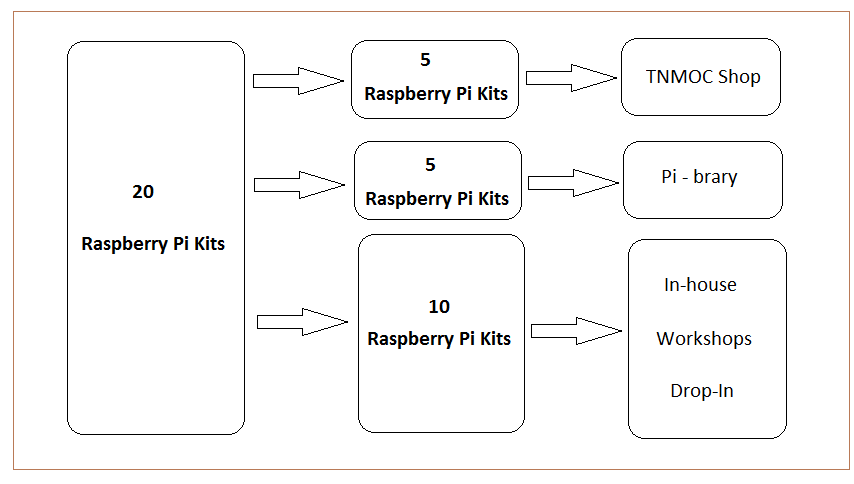Discover a great project
TNMOC Pi-brary Service Model Community Computing Hub
- Added: 30/10/16
This is an opportunity to implement the concept of the community computing hub.
Overview
A notable observation from the "Use of the Raspberry Pi to Promote Community Computing" project is the value attached to the opportunity for participants to have a feel of the hardware before committing to buying a Raspberry Pi kit. This project involves the implementation of a model community computing hub through a partnership with The National Museum of Computing (TNMOC) who will house the project. TNMOC houses computers from the earliest days of computing and has a natural place for the raspberry Pi as currently the museum is lacking in terms of the state of technology today. Additionally, TNMOC hosts a range of educational and community engagement activities that blend in well with Raspberry Pi initiative. It is proposed to purchase a set of 20 Raspberry Pi kits, 10 of which will be used for in-house workshops and drop-in sessions while the other 10 kits will be used for introducing a lending service and for the TNMOC shop.
Do you want to read more less?
It is proposed to introduce a series of hands-on Raspberry Pi workshops, seminars and drop-in sessions at The National Museum of Computing open to all the community, especially parents, who may be interested in supporting their children.
10 structured Raspberry Pi workshops will be held once every two weeks on Saturday afternoons starting from 4 February 2017 to 3 July 2017 – and will be facilitated by Zi.
Weekly drop-in sessions will be held from 1:00 pm to 5:00 pm on Saturdays starting from 4 February 2017 to 29 July 2017. These will require the support of volunteers who can attend to the needs of visitors.
Ten Raspberry Pi kits will be required for residential / in-house events at TNMOC. As indicated in the AQA GCSE Computer Science specification (4512), students should be able to:
• evaluate the effectiveness of computer programs / solutions, and
• evaluate the impact of and issues related to the use of computer technology in society.
By design, the workshops and seminars will seek to provide opportunity for project participants to fulfil these requirements in addition to acquiring the practical technical skills such as computer programming as well as systems development. They will also provide opportunity for The National Museum of Computing to develop links with professional associations such as the British Computer Society, the Institute of Engineering and Technology, Institute of Physics, IEEE, universities, industry, etc, by inviting knowledgeable speakers and presenters to facilitate the seminars and workshops.
Funding from the grant will be used to purchase 20 Raspberry Pi kits along with Arduino starter kits. Ten of these kits will be retained as a permanent asset for the in-house workshops and drop-in sessions at TNMOC. Another 10 Raspberry Pi kits will be used for introducing a lending / borrowing service (Pi-brary) to allow project participants who are interested to borrow the kits and try things out at home.
One of the questions asked at MK Academy during a meeting to introduce the raspberry Pi was whether we had nay for sale. A possible variation (depicted above) is to try out 5 Raspberry Pi kits for the Pi-brary and 5 for the TNMOC shop. This is an effective way of targeting those who may wish to buy their own while at the same time test marketing the Phase One proposed pre-configured systems. Technical support will be provided to people who buy from TNMOC and kits can be replenished from the sales.
A set of national computing curriculum resources such as GCSE computer science / computing text books, along with Raspberry Pi and Arduino “Getting Started” texts, will be included to provide a reference for project participants allowing them to have a feel of the level of computing knowledge expected of children.
A survey of the level of computing activity in schools since the introduction of computing on the national curriculum in September 2014 will also be carried out. This is one aspect that was originally proposed for the ``Use of the Raspberry Pi to Promote Community Computing Literacy'' project but could not be fulfilled because of unfulfilled assumptions about the potential role of other departments at UCMK.
As an added community engagement strategy, some raspberry pie baking events will also be incorporated into the events as part of hospitality. The procedure for baking the raspberry pies will be used to illustrate computational thinking concepts such as algorithms.
At the end of the project TNMOC will absorb the Raspberry Pi resources and establish a long-term service based on lessons learnt during the project.
One of the main aims for the museum is to inspire future generations to think and discover the possibilities with STEM and hopefully progress into a career with STEM.
Over 4000 students yearly attending our educational programmes currently. Schools visiting from all across the UK and are mainly key stage 3 – 4 but also include university visits from across the globe.
At the weekend we have around 50-100 visitors per day (Sat & Sun) which consist of families again made up from 5-16 year olds who are usually interested about STEM topics and are often keen to see what they can do outside their school programme.
By hosting these workshops we can bring a opportunity for the museum to work in the community more and provide a location for local families to discover the magic of coding and things they can build and do and hopefully go away to purchase their own kit.

